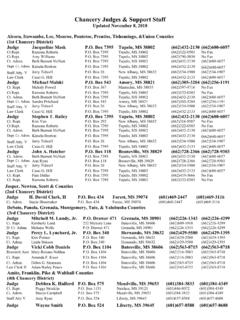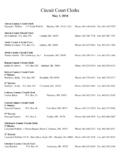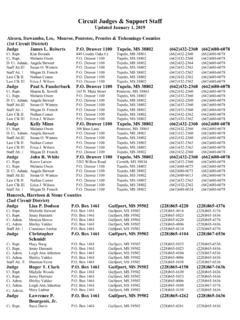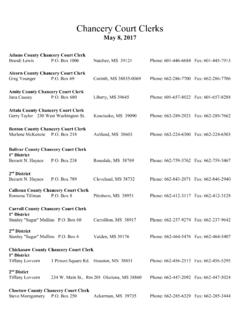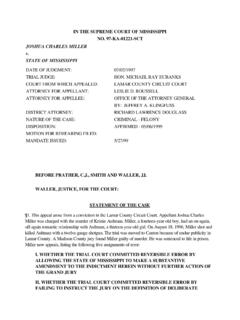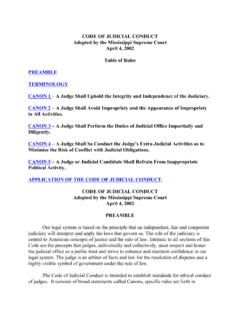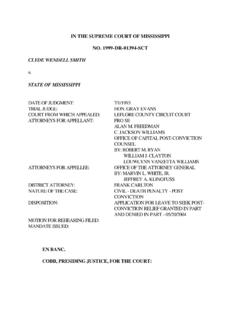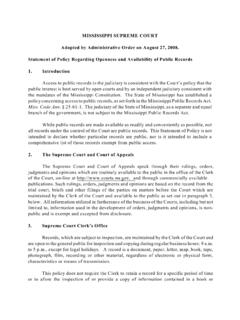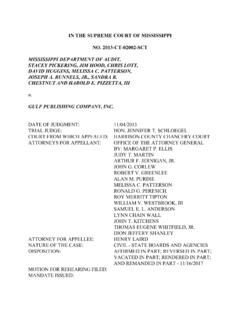Transcription of Professional Conduct, Miss. Rules of
1 mississippi Rules OFPROFESSIONAL CONDUCTT able of Rules CLIENT-LAWYER of of of Interest: General of Interests: Prohibited of Interest: Former Disqualification: General Government and Private Judge or as Under a Property. mississippi IOLTA Program Notice of or Terminating of Law for Use by Third Claims and Toward the to Opposing Party and and Decorum of the as Responsibilities of a in Nonadjudicative WITH PERSON OTHER THAN in Statements to With Person Represented by with Unrepresented for Rights of Third FIRMS AND of a Partner or Supervisory of a Subordinate Regarding Non-Lawyer Independence of a Practice of on Right to Pro Bono Public in Legal Services Reform Activities Affecting Client and Court-Annexed Limited Legal Services ProgramsINFORMATION ABOUT LEGAL Concerning a Lawyer s Contact With Prospective Clients.
2 Service of of Certificate or Names and THE INTEGRITY OF THE Admission and Disciplinary and Legal Professional Rules OFPROFESSIONAL CONDUCTE ffective July 1, 1987 PREAMBLE: A LAWYER'S RESPONSIBILITIESA lawyer is a representative of clients, an officer of the legal system and a publiccitizen having special responsibility for the quality of justice. As a representative of clients, a lawyer performs various functions. As advisor, alawyer provides a client with an informed understanding of the client's legal rights andobligations and explains their practical implications. As advocate, a lawyer zealously assertsthe client's position under the Rules of the adversary system. As negotiator, a lawyer seeksa result advantageous to the client but consistent with requirements of honest dealing withothers. As intermediary between clients, a lawyer seeks to reconcile their divergent interestsas an advisor and, to a limited extent, as a spokesperson for each client.
3 A lawyer acts asevaluator by examining a client's legal affairs and reporting about them to the client or addition to these representational functions, a lawyer may serve as a third-partyneutral, a nonrepresentational role helping the parties to resolve a dispute or other matter. 4 Some of these Rules apply directly to lawyers who are or have served as third-party neutrals. See, , Rules and In addition, there are Rules that apply to lawyers who are notactive in the practice of law or to practicing lawyers even when they are acting in anonprofessional capacity. For example, a lawyer who commits fraud in the conduct of abusiness is subject to discipline for engaging in conduct involving dishonesty, fraud, deceit,or misrepresentation. See Rule all Professional functions a lawyer should be competent, prompt and diligent.
4 Alawyer should maintain communication with a client concerning the representation. Alawyer should keep in confidence information relating to representation of a client except sofar as disclosure is required or permitted by the Rules of Professional conduct or other lawyer's conduct should conform to the requirements of the law, both inprofessional service to clients and in the lawyer's business and personal affairs. A lawyershould use the law's procedures only for legitimate purposes and not to harass or intimidateothers. A lawyer should demonstrate respect for the legal system and for those who serveit, including judges, other lawyers and public officials. While it is a lawyer's duty, whennecessary, to challenge the rectitude of official action, it is also a lawyer's duty to upholdlegal a public citizen, a lawyer should seek improvement of the law, access to the legalsystem, the administration of justice and the quality of service rendered by the legalprofession.
5 As a member of a learned profession, a lawyer should cultivate knowledge ofthe law beyond its use for clients; employ that knowledge in reform of the law and work tostrengthen legal education. In addition, a lawyer should further the public s understandingof and confidence in the rule of law and the justice system because legal institutions in aconstitutional democracy depend on popular participation and support to maintain theirauthority. A lawyer should be mindful of deficiencies in the administration of justice and ofthe fact that the poor, and sometimes persons who are not poor, cannot afford adequate legalassistance. Therefore, all lawyers should devote Professional time and resources and use civilinfluence to ensure equal access to our system of justice for all those who, because ofeconomic or social barriers, cannot afford or secure adequate legal counsel.
6 A lawyer shouldaid the legal profession in pursuing these objectives and should help the bar regulate itselfin the public of a lawyer's Professional responsibilities are prescribed in the Rules ofProfessional conduct , as well as substantive and procedural law. However, a lawyer is alsoguided by personal conscience and the approbation of Professional peers. A lawyer shouldstrive to attain the highest level of skill to improve the law and the legal profession and toexemplify the legal profession's ideals of public lawyer's responsibilities as a representative of clients, an officer of the legal systemand a public citizen are usually harmonious. Thus, when an opposing party is wellrepresented, a lawyer can be a zealous advocate on behalf of a client and at the same timeassume that justice is being done.
7 So also, a lawyer can be sure that preserving clientconfidences ordinarily serves the public interest because people are more likely to seek legaladvice, and thereby heed their legal obligations, when they know their communications willbe the nature of law practice, however, conflicting responsibilities are encountered. Virtually all difficult ethical problems arise from conflict between a lawyer's responsibilitiesto clients, to the legal system and to the lawyer's own interest in remaining an upright personwhile earning a satisfactory living. The Rules of Professional conduct prescribe terms forresolving such conflicts. Within the framework of these Rules many difficult issues ofprofessional discretion can arise. Such issues must be resolved through the exercise ofsensitive Professional and moral judgment guided by the basic principles underlying theRules.
8 These principles include the lawyer s obligation to zealously protect and pursue aclient s legitimate interests, within the bounds of the law, while maintaining a Professional ,courteous, and civil attitude toward all persons involved in the legal legal profession is largely self-governing. Although other professions also havebeen granted powers of self-government, the legal profession is unique in this respectbecause of the close relationship between the profession and the processes of government andlaw enforcement. This connection is manifested in the fact that ultimate authority over thelegal profession is vested largely in the the extent that lawyers meet the obligations of their Professional calling, theoccasion for government regulation is obviated. Self-regulation also helps maintain the legalprofession's independence from government domination.
9 An independent legal professionis an important force in preserving government under law, for abuse of legal authority ismore readily challenged by a profession whose members are not dependent on governmentfor the right to practice. The legal profession's relative autonomy carries with it special responsibilities ofself-government. The profession has a responsibility to assure that its regulations areconceived in the public interest and not in furtherance of parochial or self-interested concernsof the bar. Every lawyer is responsible for observance of the Rules of Professional conduct . A lawyer should also aid in securing their observance by other lawyers. Neglect of theseresponsibilities compromises the independence of the profession and the public interestwhich it play a vital role in the preservation of society.
10 The fulfillment of this role6requires an understanding by lawyers of their relationship to our legal system. The Rules ofProfessional conduct , when properly applied, serve to define that relationship.[Amended effective November 3, 2005 to address lawyers responsibilities as arbitrators,mediators and other third party neutrals and to emphasize lawyers responsibilities topromote public understanding of the rule of law and promoting equal access to the legalsystem.] SCOPEThe Rules of Professional conduct are Rules of reason. They should be interpretedwith reference to the purposes of legal representation and of the law itself. Some of theRules are imperatives, cast in the terms "shall" or "shall not." These define proper conductfor purposes of Professional discipline. Others, generally cast in the term "may," arepermissive and define areas under the Rules in which the lawyer has Professional discretion.
